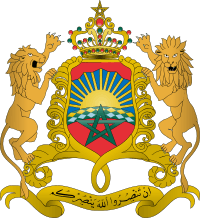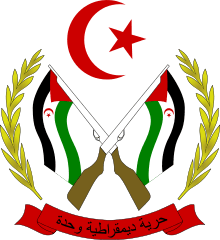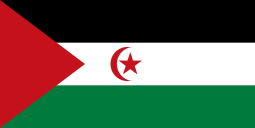Economy of Western Sahara
| Currency | Moroccan Dirham (MAD) de facto |
|---|---|
| calendar year | |
Trade organisations | Morocco claims and administers most of Western Sahara, so trade partners are included in overall Moroccan accounts. The Sahrawi Arab Democratic Republic laying claim to the territory has ratified AEC treaty, but is not active; |
| Statistics | |
| GDP | $908.9 million (2007 est) |
GDP per capita | 2,500 (2007 est) |
Labour force | 144,000 (2012) |
Labour force by occupation | agriculture (50%), services (50%) |
Main industries | Phosphates, fishing |
| External | |
Export goods | phosphates 62% |
Import goods | fuel for fishing fleet, foodstuffs |
| Public finances | |
| N/A | |
|
All values, unless otherwise stated, are in US dollars. | |
 |
| This article is part of a series on the politics and government of Morocco |
|
Monarchy |
|
Government |
| Judiciary |
|
 |
| This article is part of a series on the politics and government of the SADR |
|
Legislature
|
|
Judiciary
|
|
Administrative divisions
|
Background
The majority of the territory of Western Sahara is currently administered by the Kingdom of Morocco. As such, the vast majority of the economical activity of Western Sahara happens in the framework of the economy of Morocco.
In the Moroccan-administered territory, fishing and phosphate mining are the principal sources of income for the population. The territory lacks sufficient rainfall for sustainable agricultural production,[1] hence most of the food for the urban population must be imported. All trade and other economic activities are controlled by the Moroccan government, as usual in Western Sahara. Morocco has signed a fishing treaty with the EU including Western Sahara as part of Morocco, although it was declared illegal by the legal services of the European Union. Moroccan Energy interests in 2001 signed contracts to explore for oil off the coast of Western Sahara, but some companies had abandoned since then.
The Free Zone (POLISARIO-administered territory) is mainly uninhabited. There is practically no economical infrastructure and the main activity is camel herding nomadism. The government-in-exile of the Polisario Front had also signed contracts for oil exploration, but there is no practical work, due to the fact that the zones given are on the Moroccan-controlled part of the territory. According to POLISARIO officials,
The licensing initiative we are introducing today prepares for the day when the Saharawi Republic will exercise full sovereignty over all its rightful territory, including our offshore waters and our natural resources.
Fishing and oil exploration contracts concerning Western Sahara are sources of political tension.
Key agricultural products include fruits and vegetables (grown in the few oases); camels, sheep, goats (kept by nomads.)
Energy consumption
- Electricity - production: 85 GWh (2003)
- Electricity - production by source:
- Fossil fuel: 100%
- Hydro: 0%
- Nuclear: 0%
- Other: 0%
- Electricity - consumption: 83.7 GWh (2003)
- Electricity - exports: 0 kWh
- Electricity - imports: 0 kWh
- Oil - production: 0.5 barrels per day (0.079 m3/d)
- Oil - consumption: 1,750 barrels per day (278 m3/d) (2003)
Legal status, exploitation of natural resources and economic consequences on foreign corporations
In December 2004, French oil company Total S.A. decided not to renew their license off Western Sahara,[3] leaving Kerr-McGee as the unique oil company exploring in the Moroccan-occupied part of Western Sahara.
In May 2006, Kerr-McGee finally decided to not renew the contract signed with the Moroccan Authorities,[4] in part due to the desinvestments of invest funds[5][6] and the pressures of international corporate ethics groups.[7]
In March 2009, four Norwegian shipping companies desisted from Western Sahara trade.[8] Also, the Norwegian grocery store chain Coop Marked stopped their import of tomatoes from Dakhla, labelled as Moroccans.[9]
Desertec is an energy project launched in Munich in 2009, consisting on the use of solar and wind technology in the Sahara desert, with the aim to provide that energy generated to African and European countries.
In April 2010, a Desertec spokesperson confirmed to the English newspaper The Guardian that the project will not be placed in disputed Western Sahara, saying: "We want to confirm… officially that our reference projects will not be located in the West Sahara. When looking for project sites, Desertec Industrial Initiative will also take political, ecological or cultural issues into consideration. This procedure is in line with the funding policies of international development banks."[10]
Also that month, the Norwegian state-owned company EWOS stopped the purchases of fish oil from Western Sahara and Morocco (with an amount of around 10 million euros annually, and estimated between 12.000 and 20.000 tons of fish oil in total),[11] for "not being in line with the norwegian authorities recommendations".[12]
See also
- Economy of Morocco
- Legal status of Western Sahara
- Western Saharan cuisine
-
 Western Sahara portal
Western Sahara portal
References
- ↑ "Western Sahara". www.cia.gov. CIA World Factbook. Retrieved 13 July 2016.
- ↑ "RASD launches the second licensing round for the exploration of the natural resources in Western Sahara". Sahara Press Service. 6 February 2008. Retrieved 3 September 2010.
- ↑ "Upstream Online: Total turns its back on Dakhla block, 2004". Western Sahara Resource Watch. 03-12-2004. Retrieved 02-09-2010. Check date values in:
|access-date=, |date=(help) - ↑ "Last oil company withdraws from Western Sahara". Afrol News. 02-05-2006. Retrieved 01-10-2010. Check date values in:
|access-date=, |date=(help) - ↑ "Recommendation on Exclusion from the Government Petroleum Fund's Investment Universe of the Company Kerr-McGee Corporation". Ministry of Finance of Norway. 12-04-2005. Retrieved 01-10-2010. Check date values in:
|access-date=, |date=(help) - ↑ "Inversoras venden acciones Kerr-McGee por conflicto Sahara" (in Spanish). Western Sahara Resources Watch (EFE). 2005-06-30. Retrieved 01-10-2010. Check date values in:
|access-date=(help) - ↑ "Campaña internacional contra la última petrolera que opera en Sáhara" (in Spanish). Western Sahara Resources Watch (Afrol News). 01-03-2005. Retrieved 01-10-2010. Check date values in:
|access-date=, |date=(help) - ↑ "Shipping companies desist from Western Sahara trade". Western Sahara Resource Watch. 2009-03-24. Retrieved 02-09-2010. Check date values in:
|access-date=(help) - ↑ "Coop stops import of occupation tomatoes". Norwatch. 11-03-2009. Retrieved 02-09-2010. Check date values in:
|access-date=, |date=(help) - ↑ Maung, Zara (2010-04-23). "Solar giant Desertec to avoid Western Sahara". London: The Guardian. Retrieved 02-09-2010. Check date values in:
|access-date=(help) - ↑ "EWOS avslutter kjøp av fiskeolje fra Marokko og Vest-Sahara" (in Norwegian). EWOS. 09-04-2010. Retrieved 02-09-2010. Check date values in:
|access-date=, |date=(help); External link in|publisher=(help) - ↑ "Gir etter for laksepress" (in Norwegian). Dagbladet. 10-04-2010. Retrieved 02-09-2010. Check date values in:
|access-date=, |date=(help)
External links
- Economy of Western Sahara at DMOZ
- SADR Oil and Gas exploration, licence offering
- Economy of Western Sahara
